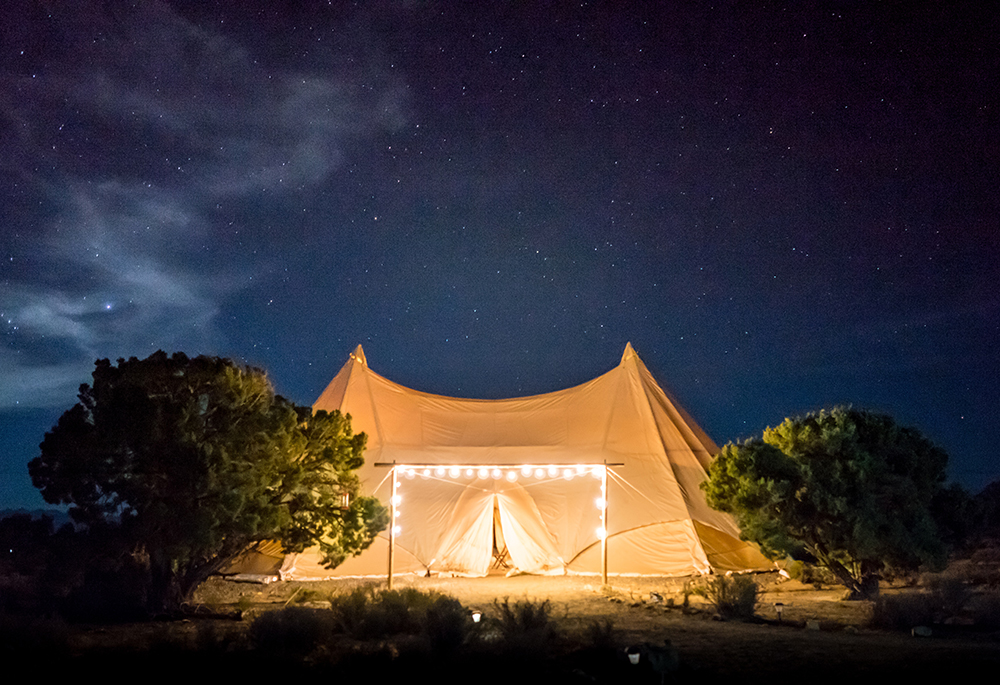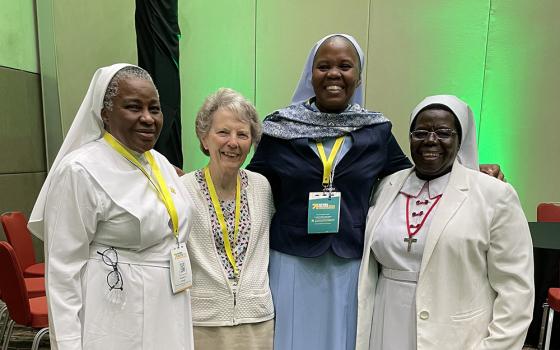
(Unsplash/Cindy Chen)
The tent is expanding. I repeat, the tent is expanding.
Finally.
Last week (April 26) the Vatican office in charge of the synod on synodality made a historic announcement: Women will be able to vote at October's assembly, the first time women and lay people will be allowed to vote at a meeting of the Synod of Bishops.
As the International Union of Superiors General, or UISG, lauded in its press release this week, the move to allow women to vote "enriches ecclesial dynamism, manifesting openness and readiness to welcome God's newness in gradually renewing the Church by revealing its full richness," all while preserving the synod's episcopal nature.
In some ways this is a logical next step in the growing movement of synodality in the church. It should have been expected, and still to have the votes and voices of women acknowledged, affirmed, and uplifted feels like a big (if not also a long anticipated) step on the journey towards church governance and direction setting that is more inclusive of the entire people of God.
Anticipating that the work of the October assembly will include issues surrounding women's roles in the church and LGBTQ relationships, among a cavalcade of other issues, it's encouraging to know that the diversity of voices at the table will be increased. And yet, there is still more expansion that awaits us if we're willing to be stretched by the Spirit.
"We are all called to become an active part of a relational, inclusive and dialoguing Church" Sr. Nadia Coppa of the Adorers of the Blood of Christ, president of the UISG, commented this week. This includes those few hundred who will have a vote at the synod and the millions more whose voices have lifted their voices thus far in the current synodal process.
In an informative piece of news analysis out this week, Sebastian Gomes of America traces the growing desire and demand over the last 10 years for women to be able to vote at the Synod of Bishops. Swelling support speaks to the collaborative model Francis has tried to put forward in the synodality that has characterized his pontificate, and also the growing realization that for our church to truly be catholic, we need to listen to the voices of the people of God.
This listening will now include the right to vote. Come October, about 1 in 5 of the synod's 370 participants will be non-bishops, with at least 1 in every 10 being a woman. Ten percent may not feel like a lot and yet the double-digit figure is encouraging. As research from Rensselaer Polytechnic Institute suggests, "when just 10 percent of the population holds an unshakable belief, their belief will always be adopted by the majority of the society."
Of course, the synod participants are all individuals with their own opinions and we trust that the Spirit is at work in the synod on synodality. Yet, having women at the table can only enrich the conversation and the ability for all participants to vote on the synod's concluding document promises a more representative mode of participation.
Advertisement
The matters of concern for women, after all, are matters of concern for the world. As Sr. Mary Luke Tobin, one of the 15 women auditors (see: non-voting) originally invited to the Second Vatican Council, famously retorted when told that she could only attend council sessions of "particular concern" for women: "Good, that means I can attend them all." I can only imagine the impact women voting at the Second Vatican Council would have had.
Yet, I wonder too who else's voices and votes need to be at the tables of power as we move forward on the synodal way. It's important to have women represented and to have people from all of the continental assemblies in attendance. Still, I wonder about LGBTQIA+ individuals … will they be represented? What about gender nonbinary persons? What about those who remain unseen in our church, those who are disregarded, and those who we don't envision immediately when we use the term "the laity"?
So often when we use the term "lay people," we think of people like us … but what if we are being invited to expand the tent of our perception to include those beyond our own circles or preconceptions?
A contingent of only a little over 70 non-bishop (and hopefully predominantly lay) representatives at the October assembly makes an expansive sense of representation difficult at the highest levels of the synod. We certainly can (and should) rejoice in those whose voices and votes will be counted and included. The question, considering the size of that assembly though, is how we are going to enlarge the space of our tents at other levels too? To welcome a diversity of voices on the ground level of the church, in parish, school, and social settings.
Where are there spaces of welcome to be created? Who are new neighbors for us to meet? How are we being called to push out the walls of our secure church structures to let the Spirit blow through? Like God the Creator breathing life into the dust, new life might thus spring forth. We might find ourselves rejoicing in opportunities we never thought possible, avenues we didn't deem viable, and situations made more hospitable.
With each new step on the synodal way, surprises are surfacing as our footsteps kick up the dust of new life. This dust shows us that walking the Way stirs things up, a process of mess making that ultimately holds hope. In this Easter season, we're called to rejoice in the One who walks the Way with us, the resurrected Christ who calls us to new life. As we enlarge our tents, let us rejoice in the promise of expansion and continue to lift up our voices so that all the world may hear the good news.








